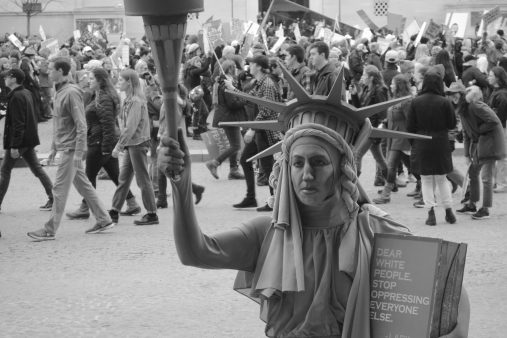On White Privilege and Anesthesia
21 March 2022
America has, once again, entered a period of public racial reckoning. No single event has brought us to this place. A malignant presidency and the January 6th attack on the U.S. Capitol have tested the resilience of our republic. A global pandemic coupled with an economic recession and accelerating climate change have pushed us into a world few recognize. Black Lives Matter, #SayHerName, and other social justice movements have invited white people to return to James Baldwin’s disagreeable mirror– the mirror that shows white people the parts of ourselves and our histories that we would rather not feel.
The social value of whiteness is usually discussed in terms of privilege– that special class of systemically conferred and culturally nourished advantages that benefit white-looking people. The etymological roots of privilege (‘private law’) point to its capricious nature. Whiteness confers unearned advantages across a variety of situations. Whiteness calms police officers. It enhances credibility, reliability, and trustworthiness. Whiteness gets people’s attention. It signals leadership. It makes white employers think you are a ‘good fit’ for the position. The meme-worthy request to ‘check your privilege,’ invites us to make visible those unearned advantages we are socialized to ignore. When we interpret this request narrowly, as simply an invitation to make visible privilege’s hidden value, we do the work of the head not the heart. This is not accidental. White people are more comfortable considering what whiteness does for us, than we are feeling what it does to us. But, we need to feel the damage because racism doesn’t just live in our thoughts, it resides comfortably in our hearts, guts, and bodies. It has weight.
My recent book The Weight of Whiteness: A Feminist Engagement with Privilege, Race, and Ignorance (2021) attends to the weighty dimension of what white supremacy does to us. Weights are measured in kilos, ounces, or carats. The weight of whiteness is measured in the costs and losses to our collective humanity. Black, Indigenous, and people of color feel the weight of whiteness daily. Claudia Rankin felt the weight when white men repeatedly cut in front of her as she waited to board her flight. Breonna Taylor felt the weight when the Louisville police battered down her apartment door and shot her eight times. Some white people recognize the weighty imprint of whiteness on people of color’s lives. However, when we are asked to attend to the weight in our own being we become confused and resistant. I don’t know what you are talking about! I don’t feel any weight. Whiteness doesn’t feel heavy for me at all! These responses are significant. It’s not that white people feel nothing at all. We feel something. What we feel is numbness. Privilege anesthetizes us to the damage within us. White people are numb to the fact that we have surrendered our humanity in the name of belonging.
I want to invite you to a ‘weighty conversation,” one that asks white people to consider the how the habits of whiteness contort our humanity. My invitation summons white people to take up relational understandings of how the violence done to communities of color depends on white people being psychologically, morally, materially, spiritually, and epistemically disfigured enough to allow that violence to continue generation after generation. Mab Segrest describes the numbness as the “anesthesia of power.” Consider how desensitized white spectators attending slave auctions, public lynchings, and other acts of violence had to become for the violence to continue. Think about how these atrocities continue today under different names– our increased tolerance for the incarceration of immigrant children, school shootings, human trafficking, and police violence against Black and Brown communities.
The language of anesthesia helps me to understand why it takes so much time and labor to name and feel whiteness’s weight. The anesthesia of privilege can be broadly understood as anything that allows white people to look away, stop listening, disconnect, dissociate, distract ourselves, or otherwise break the connections we have with other beings. The everyday anesthetizing habits of white people appear as inattention, lack of interest, or indifference to the concerns, needs, lived experiences, and traumatic histories that communities of color repeatedly put before us. Most white people are so habitually hooked on whiteness that we can’t imagine what it’s like to live without anesthesia.
White privilege and supremacy rely on white ignorance, distraction, and anesthesia to function smoothly. We anesthetize ourselves when we blame marginalized groups for the injustices they suffer and for “making us” feel guilty about it. We desensitize our hearts when we fail to be fully present for people of color when we are in one another’s company. White talk, white fragility, and white defensiveness are anesthesia, and so is ignorance. Segregation is anesthesia because it breaks human connections geographically and spatially. We anesthetize ourselves when we confine our lives to white spaces to avoid the discomfort of moving through locations where our whiteness feels raw and exposed. We numb out when we consign racial violence to the past and offer accounts of what things are better today. The mantra “I don’t see color,” numbs us to the fact that race is often the first thing noticed about somebody. The anesthesia kicks in when we act as if some people’s lives, neighborhoods, cultures, histories, and well-being matter more than others. The myth of meritocracy makes white people unresponsive to the reality that people of color work three times as hard to get half as far. These anesthetizing habits of whiteness permit white people to move through the world on a less-vibrant emotional register, half-awake, uncurious, and oblivious to the fact that the insensitivity to our own insensitivity contributes to people of color’s continued suffering.
I’m convinced that our collective survival depends on white people having the courage to leave the comforts of whiteness long enough to attend to the weight of our own brokenness– long enough to break the habit of choosing anesthesia over knowledge. The uncertain nature of these times offers the opportunity to slow down long enough not only feel and hold space with the weight that breaks us, but also to cultivate the sensitivity required to cut through the anesthesia. The weighty conversation is not optional. There is too much at stake. White supremacy banks on white people’s fear of the weighty conversation. So long as we are numb to the weight of whiteness in own being the violence will continue. White supremacy does not want white people to feel its weight because if we realized its true costs; that is, if the price of whiteness were presented to us as an actual bill, then we would realize that the racial contract that Charles W. Mills describes is really a suicide pact.
Photo by Alison Bailey Women’s March in Washington, D.C., 2016
- October 2025
- September 2025
- August 2025
- July 2025
- June 2025
- May 2025
- April 2025
- March 2025
- February 2025
- January 2025
- December 2024
- November 2024
- October 2024
- September 2024
- August 2024
- July 2024
- June 2024
- May 2024
- April 2024
- March 2024
- February 2024
- January 2024
- December 2023
- November 2023
- October 2023
- September 2023
- August 2023
- July 2023
- June 2023
- May 2023
- April 2023
- March 2023
- February 2023
- January 2023
- December 2022
- November 2022
- October 2022
- September 2022
- August 2022
- July 2022
- June 2022
- May 2022
- April 2022
- March 2022
- February 2022
- January 2022
- December 2021
- November 2021
- October 2021
- September 2021
- August 2021
- July 2021
- June 2021
- May 2021
- April 2021
- March 2021
- February 2021
- January 2021
- December 2020
- November 2020
- October 2020
- September 2020
- August 2020
- July 2020
- June 2020
- May 2020
- April 2020
- March 2020
- February 2020
- January 2020
- December 2019
- November 2019
- October 2019
- September 2019
- August 2019
- July 2019
- June 2019
- May 2019
- April 2019
- March 2019
- February 2019
- January 2019
- December 2018
- November 2018
- October 2018
- September 2018
- August 2018
- July 2018
- June 2018
- May 2018
- April 2018
- March 2018
- February 2018
- January 2018
- December 2017
- November 2017
- October 2017
- September 2017
- August 2017
- July 2017
- June 2017
- May 2017

